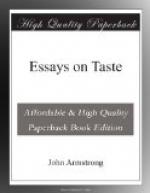Feel to the toes and horns grave Milton’s rage.
Tho’ liv’d he now he might appeal with scorn
To Lords, Knights, ’Squires and Doctors, yet unborn;
Or justly mad to Moloch’s burning fane
Devote the choicest children of his brain. 190
Judge for yourself; and as you find report.
Of wit as freely as of beef or port.
Zounds! shall a pert or bluff important wight,
Whose brain is fanciless, whose blood is white;
A mumbling ape of taste; prescribe us laws 195
To try the poets, for no better cause
Than that he boasts per ann. ten thousand clear,
Yelps in the House, or barely sits a Peer?
For shame! for shame! the liberal British soul
To stoop to any stale dictator’s rule! 200
I may be wrong, and often
am no doubt,
But right or wrong with friends with foes
’twill out.
Thus ’tis perhaps my fault if I
complain
Of trite invention and a flimsy vein,
Tame characters, uninteresting, jejune,
205
And passions drily copied from [A]Le Brun.
For I would rather never judge than wrong
That friend of all men, generous Fenelon.
But in the name of goodness, must I be
210
The dupe of charms I never yet could see?
And then to flatter where there’s
no reward—
Better be any patron-hunting bard,
Who half our Lords with filthy praise
besmears,
And sing an Anthem to ALL MINISTERS:
Taste th’ Attic salt in ev’ry
Peer’s poor rebus, 215
And crown each Gothic idol for a Phoebus.
[Footnote A: First painter to Lewis XIV. who, to speak in fashionable French English, called himself LEWIS THE GREAT. Our sovereign lords the passions, Love, Rage, Despair, &c. were graciously pleased to sit to him in their turns for their portraits: which he was generous enough to communicate to the public; to the great improvement, no doubt, of history-painting. It was he who they say poison’d Le Sueur; who, without half his advantages in many other respects, was so unreasonable and provoking as to display a genius with which his own could stand no comparison. It was he and his Gothic disciples, who, with sly scratches, defac’d the most masterly of this Le Sueur’s performances, as often as their barbarous envy could snugly reach them. Yet after all these atchievements he died in his bed! A catastrophe which could not have happened to him in a country like this, where the fine arts are as zealously and judiciously patronised as they are well understood.]
Alas! so far from free, so
far from brave,
We dare not shew the little Taste we have.
With us you’ll see ev’n vanity
controul
The most refin’d sensations of the
soul. 220
Sad Otway’s scenes, great Shakespear’s




